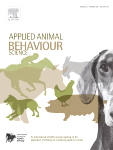Document type: scientific article available online before publication in Applied Animal Behaviour Science
Authors: Miina Lõoke, Paolo Mongillo, Martina Bortolotti, Simona Normando, Lieta Marinelli
Preview: Although the popularity of domestic donkeys is increasing, the scientific literature on their behavior is still limited. This study investigated the social behavior of a group of 13 donkeys (10 females, 3 geldings, aged 3-13 years) stabled in an Animal Assisted Interventions facility in the North of Italy. Our first aim was to assess the distribution of donkeys' intraspecific social behaviors during daytime and the second aim was to characterize affiliative and agonistic social interactions during peak activity times. Social behaviors were expressed more between 8 and 9 AM than the rest of daytime, mainly reflecting the expression of affiliative behavior. The latter consisted mostly of proximity (55.0% of all affiliative) and following (29.2%). In most cases affiliative behavior was expressed within preferential dyads, composed of either a mother and her offspring or two adult donkeys. This supports the idea that dyadic relationships are a predominant feature of the social organization of the species. However, dyadic interactions were not observed in the oldest sub-adults, suggesting that social preferences undergo a change around the time donkeys reach full growth. Agonistic behaviors were much less common than affiliative ones. The most expressed agonistic behavior was threat (51%), followed by displacement and bite (both 18.5%). They were less expressed by donkeys who were part of an affiliative pair, suggesting that limited expression of agonistic behavior is associated with an actual change in social preferences, not a mere consequence of fewer occasions of conflict over resources. While the study has limitations, the results provide insight into the social behavior of domestic donkeys which could represent a starting point for further research as well as relevant information for donkeys farming.




